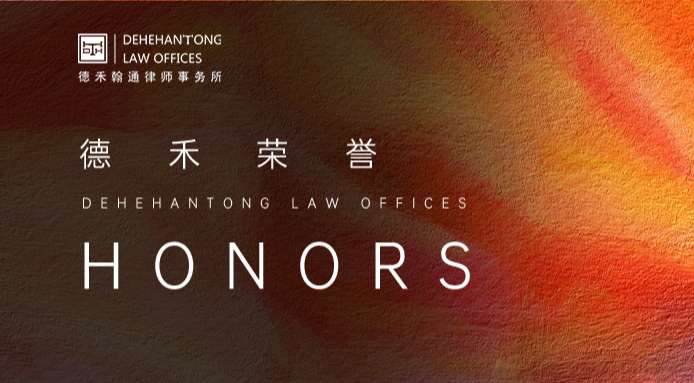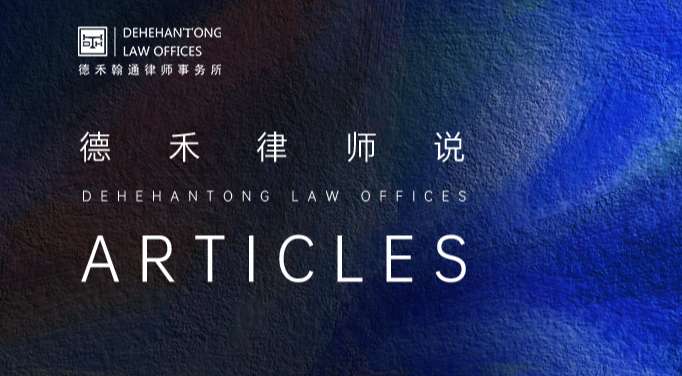-
2026-02-06 ArticlesPractical considerations for adding Non-Signatories in international arbitrationThis article, based on the latest judicial precedents and arbitration rules from major global jurisdictions, conducts an in-depth analysis of the entity paths, strategies, and enforcement risks for joining Non-Signatories.
-
2026-01-28 ArticlesKey Compliance Points for Changes in the Actual Controller of Private Equity Securities Investment Fund ManagersArticle 48 of the "Regulations on the Registration and Filing of Private Equity Investment Funds" stipulates: If the controlling shareholder, actual controller, or general partner of a private equity fund manager undergoes a change, the private equity fund manager shall complete the change procedures with the Association within 30 working days from the date of the change, submit a special legal opinion, and issue a legal opinion on the change matters.
-
2026-01-26 ArticlesInterview with a Person | From Criminal Defense to Corporate Anti-Corruption: The Professional Breakthrough of a Criminal Lawyer - Lawyer Zheng ChenA life governed by law, wisdom like an ocean, a sincere heart like a bell, and working together with Dehe. Every lawyer at Dehe holds the original aspiration of serving the people, adheres to the service philosophy of "diligence, craftsmanship, and excellence", and marches forward bravely on the broad road of the rule of law with an energetic spirit. They shine and excel in their beloved fields. In the "Personality Interview" of Dehehantong, we invite you to join us in exploring the diverse lives of the Dehe people.
-
2026-01-21 ArticlesSecurities Listing Series (Part 1) Case Warning - The Legal Liability Logic for Financial Fraud by Listed CompaniesIn recent years, the process of legal reform in the capital market has accelerated, and the regulatory signal of zero tolerance for financial fraud has been continuously strengthened. The investigations of landmark cases such as Kangmei Pharmaceutical and Zanzhai Island have clearly delineated the extensive legal net for administrative, criminal and civil accountability. This article will, through the review of typical judicial cases, focus on analyzing the core logic, evidence transformation path and key challenges in current accountability practices for financial fraud from administrative determination to criminal prosecution, aiming to provide guidance for all market participants in understanding and responding to the legal risks of financial fraud.
-
2026-01-21 ArticlesManus Maritime Adventure - A Brief Trend of Technology Enterprises Going Global from the Perspective of a Compliance LawyerA $2 billion acquisition deal, a Chinese AI star company that had been praised by CCTV, a lightning-fast headquarters relocation, and a review notice from the Chinese Ministry of Commerce - this was the most talked-about Manus acquisition by Meta in the AI market and the global tech circle in 2025-2026. Too many enterprises have set sail with technological dreams and business ambitions, but they do not fully understand the rules of geopolitical and international regulatory waters. The compliance review of Manus is still pending, but due to its unique development trajectory and the current review predicament it faces, it is likely to become a typical case of tech companies going global in the future. It clearly reveals a core proposition: In today's world where technology has become a key focus of competition, the internationalization path of enterprises is no longer simply market expansion or capital operation; it is a multi-dimensional compliance journey involving technology exports, cross-border data, company structure, investment review, cross-border mergers and acquisitions, etc. This article will review Manus' journey, analyze the legal logic behind the review, and attempt to provide a guide for all Chinese tech companies that are currently or plan to go global.
-
2026-01-21 ArticlesThe Legal Risks and Countermeasures throughout the Entire Process of Micro-Drama InvestmentMicro-dramas refer to short episodic works with relatively short duration and mainly played in portrait mode. They have now become one of the entertainment choices for an increasing number of people. The "White Paper on the Development of China's Micro-Dramas (2025)" shows that in 2025, the user base of micro-dramas in China was 696 million, and it is estimated that the number of independently produced and released vertical-screen dramas throughout the year would be approximately 40,000.
Offices









-
-
Corporate & Commercial
-
Dispute Resolution
-
Non-Performing Assets & Debt Restructuring
-
Bankruptcy Liquidation & Restructuring
-
Criminal Defense
-
Intellectual Property Rights
-
Competition & Antitrust
-
Labor & Social Security
-
Family Wealth Management
-
Cross-Border Investment & Financing
-
Mergers & Acquisitions
-
Capital Markets
-
Government & Public Services
-
Maritime & Admiralty Law
-
Finance
-
Compliance
-
Taxation
-
Real Estate Development
-
Construction Project
-
International Trade
-
-
-
Energy, Minerals and Electricity
-
Banking & Finance
-
Technology, Media & Telecommunications
-
Health & Life Sciences
-
Medical, Pharmaceutical & Health
-
Media & Entertainment
-
Industrial & Manufacturing Sector
-
Real Estate & Construction
-
Environmental Protection
-
Consumer Goods & Retail
-
Sports Sector
-
Agriculture & Food
-
Education & Minors' Rights Protection
-





